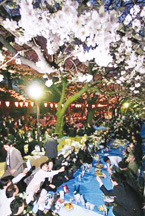Relish Spring with Hanami

you know spring has sprung when it´s time for Hanami
April 16, 2005
BY YASUHITO YAMAMOTO
The snow is gone, the temperature is getting high-spirited-so what are your plans now? When this time of year comes, many Japanese people are likely to celebrate the new season under cherry blossoms in an event called Hanami. Along with the beginning of school and new graduates entering into the work force during April, Japanese people usually open their new life around April and celebrate it with Hanami. In fact, if you go walk through Ueno park in Tokyo around this time, you will be facing enormous number of groups reserving their own territories under blossoming cherry trees by staying all night for a few days in advance just to reserve the best spots. You will also witness group after group of people doing a never-ending eat-sing-drink dance. So, why don’t we take a look at the tempting celebration and try to have our very own Hanami event right here in Boston?
Having a party under a bloomed cherry tree is not a new thing for Japan. Cherry blossoms have always seasoned in Japanese people’s lives and people have appreciated and corresponded with this beauty for hundreds of years. In 794 AD, a new emperor started the Nara Period, and he planted cherry trees in his huge backyard (something like our Public Garden), and when spring came with full bloom of cherry trees, he celebrated the scenery with his friends by having poetry readings and traditional dances. If you look through the oldest existing poetry book in Japan, you can find lots of poems praising cherry blossoms relating the beauty to his or her lover. Quickly, this became very popular among his fellow aristocrats, and thus, the custom of Hanami started.
In 1598, a shogun, Hideyoshi Toyotomi (imagine our president, for instance), held a huge Hanami celebration in Kyoto mainly to entertain his family with more than 1,300 people. Later, he also held another huge Hanami, and this one was open to all kinds of people, regardless of their social station. Following this, ordinary citizens also started having Hanami as an annual event.
In the 1960s, when the capital moved to Edo (now Tokyo), the shogun at the time planted cherry trees along the rivers and streets. With prosperity in the economy, ordinary people started getting more free time and more money to spend on leisure activity. Along with this, Hanami became more rooted in the masses. It’s said that the basic traditions of Hanami were established at this time; a party under bloomed cherry trees, drinking and singing, and then more drinking and fighting.
Later, one monk produced a rice cake using cherry leaves, called Sakura-Mochi. He sold it, and it became a blockbuster hit among Hanami celebrators. Eventually people’s focus inevitably shifted more from the beautiful blossoms to the food and drinks enjoyed during the celebration. Since then, the tradition has been passed down to many people in Japan. One headline of Japanese newspaper on April 8 shows, “100 thousand people came down to see full-bloomed cherry trees.” Another paper introduced one company that was having Hanami with 180 people on Friday night, and the ten chief organizers proudly exclaimed to the interviewer that they “‘defended’ the best location, spending the night before under the trees.”
Having fun under a bloomed cherry tree has been introduced to the United States, too, and you might have heard on TV or radio recently that the 2005 Cherry Blossom Festival was held from March 26 to April 10 in Washington. In Boston, we have several locations where we can observe bloomed cherry trees soon. One is a contemplative garden called Tenshin-En at the Museum of Fine Arts. The garden has a weeping cherry tree and opens around April 15 through the mid-October from 10 a.m. to 4:30 p.m. According to them, the flowering time of this year will be around May. In addition, if my eyes are correct, there seems be a cherry tree in a garden next to the Massachusetts Archive, a building in front of JFK Library. At the route 1 bus stop, if you turn left and look far, you will see a Stonehenge-like object. That’s where it is. So, gather your friends, and why not have Hanami for this spring?
*Consumption of alcoholic beverages is prohibited by the law for people under age 21.





















































